
The Three from the Filling Station is a 1955 West German musical film directed by Hans Wolff and starring Adrian Hoven, Walter Müller and Walter Giller. It was shot at the Tempelhof Studios in West Berlin and on location around the city. The film's sets were designed by the art directors Kurt Herlth and Hans Kuhnert.
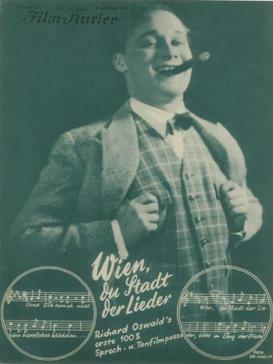
Vienna, City of Song is a 1930 German musical comedy film directed by Richard Oswald and starring Charlotte Ander, Paul Morgan and Igo Sym. It was shot at the Babelsberg Studios in Berlin. The film's sets were designed by the art director Franz Schroedter.

Target in the Clouds is a 1939 German drama film directed by Wolfgang Liebeneiner and starring Albert Matterstock, Leny Marenbach and Brigitte Horney. It was based on a novel by Hans Rabl. The film portrays the struggles of the fictional German aviation pioneer Walter von Suhr, an officer in the pre-First World War German army who saw the potential for military aircraft.

When Women Keep Silent is a 1937 German comedy film directed by Fritz Kirchhoff and starring Johannes Heesters, Hansi Knoteck and Friedrich Kramer. A newly married couple become involved in a series of marital differences, largely due to misunderstandings.
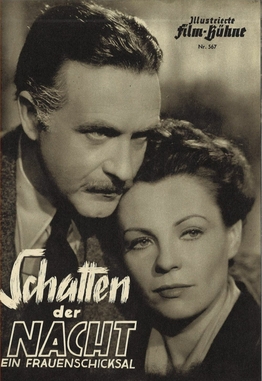
Shadows in the Night is a 1950 West German drama film directed by Eugen York and starring Hilde Krahl, Willy Fritsch and Carl Raddatz. It was made at the Wandsbek Studios by the Hamburg-based Real Film. The film's sets were designed by the art director Herbert Kirchhoff.
Rich, Young and Beautiful is a 1928 Austrian silent film directed by Fritz Freisler and starring Fay Marbe, Ernő Verebes and Igo Sym. It was made by Austria's leading film studio Sascha-Film. In 1929 the film was released in Britain by Ideal Films.
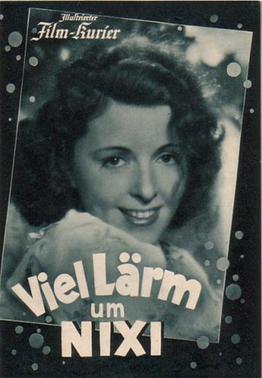
Much Ado About Nixi is a 1942 German comedy film directed by Erich Engel and starring Jenny Jugo, Albert Matterstock and Hans Leibelt. It was shot at the Cinecittà studios in Rome. A separate Italian-language version was also produced.

Dive is a 1929 German silent film directed by E. W. Emo and starring Igo Sym, Corry Bell, and Paul Samson-Körner.
Only on the Rhine is a 1930 German comedy film directed by Max Mack and starring Daisy D'Ora, Igo Sym, and Truus Van Aalten.

White Shadows is a 1951 West German drama film directed by Helmut Käutner and starring Hilde Krahl, Hans Söhnker and Claude Farell.

Night of Decision is a 1956 West German drama film directed by Falk Harnack and starring Carl Raddatz, Hilde Krahl and Albert Lieven. It was shot at Göttingen Studios and on location in Belgium. The film's sets were designed by the art directors Walter Haag.

Dangerous Game is a 1937 German comedy film directed by Erich Engel and starring Jenny Jugo, Harry Liedtke and Karl Martell.

The Coral Princess is a 1937 German-Yugoslav comedy film directed by Victor Janson and starring Iván Petrovich, Hilde Sessak and Ita Rina.
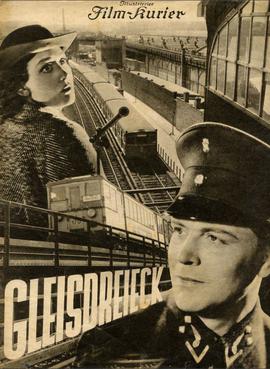
Dangerous Crossing or Rail Triangle is a 1937 German crime film directed by Robert A. Stemmle and starring Gustav Fröhlich, Heli Finkenzeller, and Paul Hoffmann. It is set amongst railway workers and takes its name from Gleisdreieck on the Berlin U-Bahn. It was partly shot at the Babelsberg Studios in Potsdam. The film's sets were designed by the art directors Carl Böhm and Erich Czerwonski. It was shot on location around Berlin. It premiered at the city's Ufa-Palast am Zoo.

Dreaming is a 1944 German historical musical drama film directed by Harald Braun and starring Hilde Krahl, Mathias Wieman and Friedrich Kayssler. It portrays the lives of the pianist Clara Schumann and her composer husband Robert Schumann.

Her Other Self is a 1941 German drama film directed by Wolfgang Liebeneiner and starring Hilde Krahl, Mathias Wieman, and Erich Ponto.
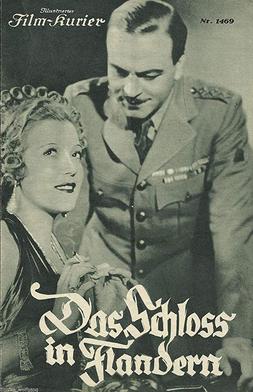
The Castle in Flanders is a 1936 German drama film directed by Géza von Bolváry and starring Mártha Eggerth, Paul Hartmann, and Georg Alexander. It was shot at the Johannisthal Studios in Berlin. The film's sets were designed by the art directors Emil Hasler and Arthur Schwarz.

My Son the Minister is a 1937 German comedy drama film directed by Veit Harlan and starring Hans Brausewetter, Heli Finkenzeller and Françoise Rosay.

One Woman Is Not Enough? is a 1955 West German drama film directed by Ulrich Erfurth and starring Hilde Krahl, Hans Söhnker and Rudolf Forster. It was shot at the Tempelhof Studios in West Berlin and on location in Munich and around Lake Starnberg. The film's sets were designed by the art directors Erich Kettelhut and Johannes Ott.
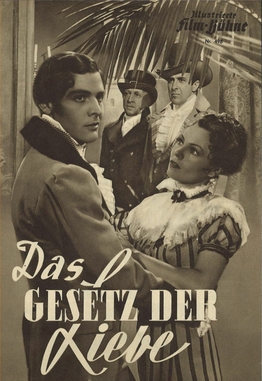
Law of Love is a 1949 German historical drama film directed by Hans Schweikart and starring Hilde Krahl, Paul Hubschmid and Ferdinand Marian. Production began in 1944 during the Nazi era and was completed by 1945, but the end of the Second World War led to delays in its distribution as also occurred with several other productions. It was not released for a further four years until its premiere in Erlangen, Bavaria in the newly established West Germany. Its West Berlin premiere took place in May 1950.


















